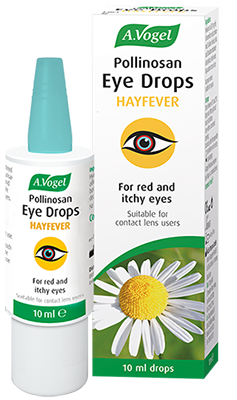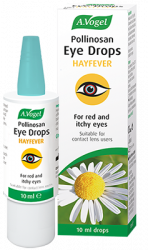An introduction to eye problems and hayfever
Eye problems are perhaps the most common or significant symptom of hayfever. When pollen lands on the eye, not only does this irritate the sensitive tissues, but also triggers the release of a chemical called histamine.
This reaction of the eye to pollen and other allergens is called allergic conjunctivitis. The symptoms can cause you to feel that your vision is affected. Thankfully, this is only temporary and it is extremely unlikely that any long term damage will occur to your eyes. Nevertheless, many hayfever sufferers long for some relief from their symptoms.
Allergic conjunctivitis
Allergic conjunctivitis is the general term for problems of the outer lining of the eyes, triggered by allergies such as to pollen. Symptoms include redness in the eye, swelling and itchiness.
The symptoms of allergic conjunctivitis usually occur at around the same time each year, usually spring or summer, and also are at their worst when the pollen count is high. You may also suffer from other symptoms of hayfever such as a runny or blocked nose or ear problems.
Itchy eyes
Itchiness occurs because of irritation to the eyes. The cause of irritation is twofold. Firstly, the eye responds to pollen landing on or near it. Anyone who has ever got shampoo in their eye when in the shower will be able to identify with this response.
Secondly, the body releases the chemical histamine when pollen enters the body, and this irritates the nerve endings. Your eyes become itchy to alert you to the foreign bodies (pollen) that have entered your system and your eyes
Red eyes
After your eyes become itchy, they also tend to become red. This is because the blood vessels on the white outer surface of the eye dilate or swell. This is an inflammatory response and is designed to fight off the irritant in your eye.
When your eyes are itchy, it is tempting to rub them. However, this is likely to cause more redness. This is because rubbing your eyes increases the irritation rather than removing it, as well as damaging blood vessels.
Watery eyes
This symptom arises because your eyes produce excess tears in an attempt to flush out the pollen irritant.
Having excessively watery eyes may temporarily result in blurry vision, as this water distorts the way that light falls on the surface of the eye. As your watery tears start to dry, the tears thicken and become sticky – this can worsen blurred vision temporarily.
Swollen or puffy eyes
Many hayfever sufferers also complain of swollen or puffy eyes. This occurs because inflammation causes blood vessels to dilate or widen, bringing more fluid into the tissues affected. The eyes are prone to becoming puffy when irritated because tissues in this part of the body are looser than in other areas.
The symptoms of swollen and puffy eyes may remain for a couple of hours after the irritation has been removed from the eye. This is because it takes a little time for your blood vessels to reduce to their normal size and the fluid in tissues to be reabsorbed.
Home remedies for eye problems
The most obvious and effective advice is to avoid pollen as this will prevent your eyes from being aggravated by the irritant. However, this advice can be difficult or impossible to follow and alternatives are often sought.
Wearing glasses or sunglasses when outdoors will help to protect your eyes from pollen. Additionally, cutting back on contact lens wear will prevent pollen from being trapped in the eyes. Although difficult, try not to rub your eyes, as this will trigger further release of histamine, worsening your symptoms.
Most home remedies for eye problems revolve around cooling your eyes, for example with a cold compress or with slices of cucumber. Cold milk dabbed on the eyes is also an effective remedy.
Salty water may also be used to wash the eyes. Salt has anti-bacterial properties and will cleanse the eyes to prevent any infection from developing.
Herbs for happy eyes
You may find that the herb Euphrasia helps to ease eye problems. This herb, also known as Eyebright, has been used to treat eye conditions as far back as the 17th Century. It can be used in the form of eye drops to help soothe your irritated eyes, or internally in the form of a tincture.
However, if you are suffering from other symptoms of hayfever as well as irritated eyes, you may find that a herbal remedy which works to relieve all symptoms of hayfever is more effective. Pollinosan Hayfever Tablets combine several different herbs to target hayfever symptoms and unlike many conventional hayfever treatments, it is non-drowsy, so is safe to use if you are driving or working with machinery.
Conventional medicines for eye problems
Your doctor or pharmacist is likely to recommend anti-histamines in the first instance, to reduce your reaction to pollen. However, eye drops or eye washes may also be recommended to target the affected area.
These may have anti-histamine, anti-inflammatory or decongestant properties designed to reduce swelling and irritation. Prescription eye drops may contain steroids, although these can be associated with side-effects.





 Looking for relief of red and itchy eyes due to hayfever?
Looking for relief of red and itchy eyes due to hayfever?

